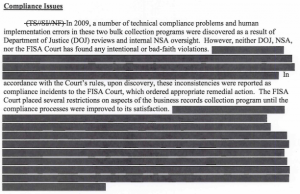Obama’s Credibility Trap
President Obama just stood before the nation and said,
And if you look at the reports — even the disclosures that Mr. Snowden has put forward — all the stories that have been written, what you’re not reading about is the government actually abusing these programs and listening in on people’s phone calls or inappropriately reading people’s emails. What you’re hearing about is the prospect that these could be abused. Now, part of the reason they’re not abused is because these checks are in place, and those abuses would be against the law and would be against the orders of the FISC.
Even as he was speaking, his Administration released a document that said, in part,
Since the telephony metadata collection program under Section 215 was initiated, there have been a number of significant compliance and implementation issues that were discovered as a result of DOJ and ODNI reviews and internal NSA oversight. In accordance with the Court’s rules, upon discovery, these violations were reported to the FISC, which ordered appropriate remedial action. The incidents, and the Court’s responses, were also reported to the Intelligence and Judiciary Committees in great detail. These problems generally involved human error or highly sophisticated technology issues related to NSA’s compliance with particular aspects of the Court’s orders. The FISC has on occasion been critical of the Executive Branch’s compliance problems as well as the Government’s court filings. However, the NSA and DOJ have corrected the problems identified to the Court, and the Court has continued to authorize the program with appropriate remedial measures.
While (as I will show in a future post), Obama’s Administration has worked hard to prevent details of these violations from becoming public and delayed even the Judiciary Committees from being briefed, some of them may come out as part of the DOJ Inspector General review that the Administration tried to thwart in 2009.
Also, even as he was speaking, EFF announced the government will turn over a redacted copy of the October 3, 2011 FISA Court ruling that found the minimization procedures for Section 702 violated the Fourth Amendment. A new Guardian report suggests that ruling may pertain to the use of a backdoor to conduct warrantless searches on US person content already collected under Section 702. (While many commentators have insisted the Guardian report provides no evidence of abuse, NSA and DNI’s Inspectors General refused to count how often Americans have been searched in such a way, effectively refusing to look if it has been abused.)
As Shane Harris astutely describes, all of this kabuki is designed solely to make people feel more comfortable about these dragnets.
And the President’s message really boiled down to this: It’s more important to persuade people surveillance is useful and legal than to make structural changes to the programs.
“The question is, how do I make the American people more comfortable?” Obama said.
Not that Obama’s unwilling to make any changes to America’s surveillance driftnets — and he detailed a few of them — but his overriding concern was that people didn’t believe him when he said there was nothing to fear.
But the President just stood up and claimed the government hasn’t abused any of these programs.
It has, by its own admission, violated the rules for them.
Meanwhile, Ron Wyden has already released a statement applauding some of these changes while noting that Obama is still minimizing how bad the violations have been.
Notably absent from President Obama’s speech was any mention of closing the backdoor searches loophole that potentially allows for the warrantless searches of Americans’ phone calls and emails under section 702 of the Foreign Intelligence Surveillance Act. I believe that this provision requires significant reforms as well and I will continue to fight to close that loophole. I am also concerned that the executive branch has not fully acknowledged the extent to which violations of FISC orders and the spirit of the law have already had a significant impact on Americans’ privacy.
Ultimately, details of these violations will come out, and are on their way out in some form already.
If this press conference was designed solely to make us feel better, wouldn’t Obama have been better advised to come clean about these violations than to pretend they don’t exist?

